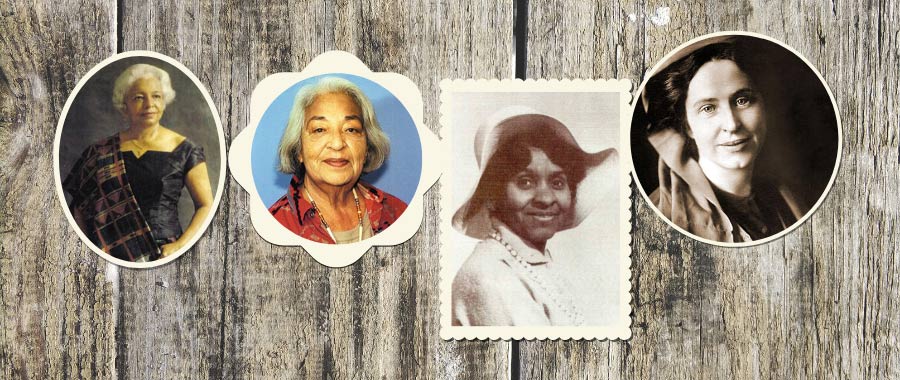The intricate tapestry of American history is woven with myriad threads, each representing a unique contribution to the fabric of society. Among the most vibrant strands are the stories of Baha’i women, whose indomitable spirits and pioneering endeavors illuminate the path toward a more just and equitable world. These women, embodying the core tenets of Baha’i teachings, serve as spiritual beacons, casting light upon the principles of unity, equality, and service that are fundamental to this faith.
In exploring the contributions of these remarkable figures, one encounters a confluence of courage, intellect, and compassion. Each woman emerged during a time when societal norms often relegated women to the periphery of public life. However, inspired by the Baha’i principles of gender equality and the pursuit of knowledge, these spiritual pioneers rose to prominence, galvanizing movements and enriching the dialogue surrounding social change.
Among the most prominent figures in this narrative is Laura Clifford Barney, a trailblazer whose work in the early 20th century exemplified the intersection of scholarship and activism. Her contributions to the Baha’i community were not defined solely by her writings but also by her staunch advocacy for the rights of women and marginalized groups. As an envoy for the Cause of Baha’u’llah, Laura traversed the globe, gathering stories of women yearning for empowerment. Her efforts resulted in a seminal work—’The Dawn-Breakers’—which not only chronicled the early Baha’i movement but also underscored the essential role of women in the divine narrative of humanity. Through her lens, one perceives the invaluable narrative of spiritual evolution entwined with the quest for justice.
Another illuminating figure is Mary Woolson, who fervently championed education as a fundamental right. In an age when formal education for women was often met with skepticism, Woolson dedicated herself to establishing schools that promulgated the principles of the Baha’i faith. Her vision extended beyond mere educational attainment; she sought to cultivate transformative environments where young men and women could foster mutual respect and collaborative learning. In this way, she epitomized the belief that education is a powerful catalyst for personal and societal advancement, emboldening individuals to challenge the status quo and cultivate their intrinsic potential.
Complementing the contributions of these women is that of Jessie E. R. Smith, whose work in promoting interfaith dialogue exemplified the Baha’i commitment to unity among diverse communities. Smith harnessed the potency of inclusive discussion to bridge gaps between differing faiths and ideologies. Seeing spirituality as a common thread that could transcend physical boundaries, her efforts inspired others to seek mutual understanding and respect. Through her initiatives, the Baha’i teachings found fertile ground in the rich soil of American pluralism—a testament to the possibility of harmony in a fragmented society.
The interconnectedness of their endeavors reflects the overarching philosophy that the betterment of humanity is contingent upon the empowerment of women. Each woman, in her respective domain, unfurled the wings of possibility for those that followed. Their actions reverberate like ripples across a serene pond, prompting others to reflect upon their potential to effectuate change. The analogy of a kite soaring high against the backdrop of a stormy sky serves as an apt metaphor for these women; while the winds of adversity sought to ground them, their unwavering resolve saw them rise above, illustrating how resilience can transform challenges into opportunities for growth.
Analyzing the lives of these spiritual pioneers reveals a shared commitment to the Baha’i principle of service. Their lives were not merely about personal achievement; rather, they embodied a profound dedication to uplifting others. This selflessness resonates with the Baha’i belief that true honor lies in the service of humanity. As they forged paths laden with obstacles, their spirits remained undaunted, a testament to the transformative power of faith in action. They teach us that our individual journeys can contribute to collective progress, marking a profound realization of the divine attributes bestowed upon humanity by Baha’u’llah.
Moreover, the legacy of these pioneering women extends into contemporary society, where their teachings continue to inspire movements for social justice, equity, and spiritual growth. The vibrant tapestry they wove is not merely a reflection of the past; it is a living testament to the ongoing struggle for equality and empowerment in the present. Women today stand on the shoulders of these giants, empowered by their stories and fueled by their relentless pursuit of a world characterized by peace and understanding.
As we contemplate the contributions of these Baha’i women, it becomes evident that their impact transcends historical confines. Each figure embodies a harmony of intellect, tenacity, and compassion—qualities that resonate within the hearts of individuals striving for a better tomorrow. Their lives are potent reminders of the responsibility each person bears to cultivate a spirit of unity and service, acting as catalysts for transformative change within their communities.
The path illuminated by these spiritual pioneers is one that invites ongoing exploration and introspection. It beckons us to acknowledge the unique appeal of the Baha’i teachings and to embrace the call to action embodied by these women. In the spirit of their legacy, may we strive to live lives steeped in purpose, actively engaging in the work of cultivating equality, fostering spiritual growth, and paving the way for future generations to flourish in a world enriched by diversity and understanding.
